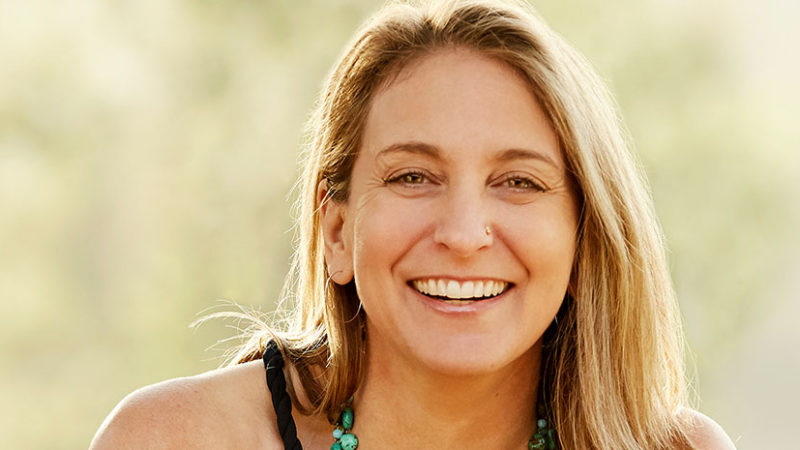
Mindfulness Rewilded
“As great as the infinite space beyond is the space within the lotus of the heart. Both heaven and earth are contained in that inner space, both fire and air, sun and moon, lightning and stars. Whether we know it in this world or know it not, everything is contained in that inner space.”
THE CHANDOGYA UPANISHAD
As someone inside “the mindfulness industry,” I have observed that yoga has become as deprived of nature as the rest of society. With our rubber-soled shoes, yoga mats, and indoor practice spaces, modern humans move from one nature-disconnected space to another. Even during those rare moments between the car and the studio, we wear shoes that prevent contact with the ground beneath our feet. Yet the practices of yoga and meditation were born in the mountains, forests, and deserts of Asia.
A few years ago, I attended a yoga conference in Manhattan, a few floors up at the midtown Hilton. After my second yoga class in a stuffy, windowless room, with hundreds of yogis in spandex moving about on rubber mats, I experienced a moment of cognitive dissonance. I love yoga—it is a powerful, beautiful practice—and I believe that the widespread increase in yoga and mindfulness practice is profoundly positive. However, something about this scenario didn’t seem quite right to me—or quite right for me.
Not long after, at another yoga and recovery conference, my friend Tim Walsh, an avid outdoorsman and recovery coach, expressed my own thoughts when he said, “Folks, we’re standing on rubber mats inside a temperature-controlled room on the second floor of a giant brick building. How much more disconnected from the earth can you get!” His words rang inside me, and at that moment, something at my core woke up. I had felt this disconnect for years, and now it was time to do something about it.
I had dreamed for many years of somehow bridging the worlds of meditation, yoga, and mindfulness with rewilding. When I finally started to research the connections between nature and mindfulness practices, I ended up creating programs for students at Kripalu that immersed us in forests and fields while practicing. I wanted to help people become conscious of their inner nature while out in nature and to help them see the importance of conserving our natural environments—the primal parts of ourselves. How did yoga and meditation, wild practices designed to awaken, empower, and enlighten, become so disconnected from the enlivening power and the beauty of the living earth? Because yoga and mindfulness have profound benefits for well-being, they have also been co-opted and commercialized. Products have proliferated—the mats and the clothing, the snacks and the food, the shoes and the hats. Our economy is driven by the consumption of things that must be extracted from the earth and produced and marketed and sold. As yoga and mindfulness became imbedded in modern culture’s mostly indoor lifestyle, these ancient practices also became cut off from the presence of the wind, sun, moon, and life of the living earth.
When we disconnect from the living earth, we lose the life-affirming wisdom that is found outdoors. If we consider the fact that we are an evolutionary expression of the evolving earth, then our own self-awareness can be thought of as the self-awareness of the living earth itself. Which is a pretty powerful idea to ponder! And it means that human rewilding can lead to a rewilding of our spirit, a reinspiriting of our essential nature.
Pacification or Liberation?
Yoga and mindfulness today are often used to help people invite calm and to support greater self-regulation and impulse control in stressful situations. But just as I’m concerned about their commodification, I’m also concerned that these ancient practices are being used as pacifiers to help people put up with the negative effects of modern society, because these ancient practices are also the tools for true liberation from the root causes of our distress.
To be clear, yoga, meditation, and mindfulness are extremely valuable practices. The abilities to take a deep breath and step back from the fight-or-flight response, to self-soothe, and to know when to practice self-care, these are all critical tools for living consciously.
I am reminded of an episode of the old television show Kung Fu, in which a martial arts master, played by David Carradine, is taken prisoner and forced into manual labor under the blazing sun. Labeled a troublemaker, he is put into a hot box, a cast-iron oven with an unbearably fierce temperature. In the box is another man who is panicked by their dangerous situation. Carradine calmly teaches the man how to meditate, to slow his breathing and witness his thoughts. At the end of the day, they are released, and both emerge from the box alert and calm, much to the surprise of their captors.
A more recent and real-life example is the group of boys on a soccer team in Thailand who were stranded for almost two weeks in a complex network of flooded tunnels. They learned to meditate from their coach, who had lived in a Buddhist monastery for 10 years. They sat in the darkness, not knowing if anyone would come to their aid, and they stayed calm and connected to one another. They were all ultimately saved by a team of divers who risked their own lives in the effort.
Meditation is a powerful antidote to fear and the modern daily stresses that can harm our health if left unchecked. Meditation can even save your life. But if you are under duress, the first thing to check is whether you can get out of it. See if the door to the hot box can be opened. Look for the escape route in the cave. If a change in the circumstances is possible, the wise action is to eliminate the cause of suffering first, and meditate later.
As a species, we often don’t even know that we are in a hot box or a dangerous cave. The stress of modern life is ubiquitous, so a change of environment may not even seem like an option. And, of course, not everyone can get away from their circumstances or difficulties. Not everyone has easy access to pristine natural places. Many can’t afford to travel to a place with fresh air and water.
I hope that the steps I teach in my book, Rewilding, for connecting with the living earth will open doors for everyone. The sunlight, the movement of air, the presence of the earth that is solid and stable even in asphalt, the dandelion coming up through a crack in the pavement, all can be entries into a wilder, more conscious, more awakened life.
For more practices in rewilding, search for “Micah Mortali” on the Sounds True blog to read his other posts or find his book, Rewilding: Meditations, Practices, and Skills for Awakening in Nature, at your favorite bookseller!

Micah Mortali is director of the Kripalu Schools, one of the largest and most established
centers for yoga-based education in the world. An avid outdoorsman, mindful wilderness guide,
500-hour Kripalu yoga teacher, and popular meditation teacher, Mortali has been leading
groups in wilderness and retreat settings for 20 years. In 2018, he founded the Kripalu School of
Mindful Outdoor Leadership. Mortali has a passion for helping people come home to themselves
and the earth, and he is finishing his master’s at Goddard College on nature awareness and
mindfulness practices. He lives with his wife and children in the Berkshires. For more, visit
micahmortali.com.
Read Rewilding today!




 Tomás Navarro is a psychologist who loves people and what they feel, think, and do. He is the founder of a consultancy practice and center for emotional well-being. He currently splits his time between technical writing, training, consultancy, conferences and advisory processes, and personal and professional coaching. He lives in Gerona and Barcelona, Spain.
Tomás Navarro is a psychologist who loves people and what they feel, think, and do. He is the founder of a consultancy practice and center for emotional well-being. He currently splits his time between technical writing, training, consultancy, conferences and advisory processes, and personal and professional coaching. He lives in Gerona and Barcelona, Spain.
















